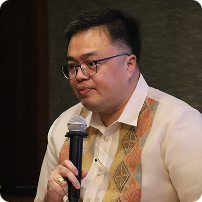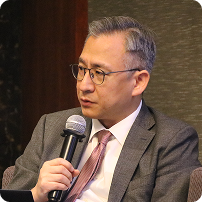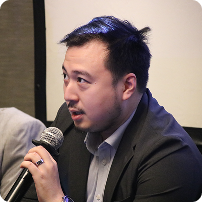Q&A
Risk and Threat Perception in the Indo-Pacific
Q&A from the Book Talk on “Risk and Threat Perception in the Indo-Pacific” in Manila
Speakers

Julio AMADOR III
Foundation for the National Interest
Philippines

Narut CHAROENSRI
Chiang Mai University
Thailand

Sang-Yoon MA
Catholic University of Korea
South Korea

NAH Liang Tuang
Institute of Defence and Strategic Studies
Singapore

NGO Di Lan
Diplomatic Academy of Vietnam
Vietnam

Yuichi YOSHIDA
Japan Institute of International Affairs
Japan
At the end of March 2025, the KAS Korea Office presented this publication to experts and officials in Manila in the form of a book talk.
In two sessions we explored maritime security and grey zone tactics in the South China Sea, along with other non-traditional security challenges like cyber security and climate change, which are becoming increasingly significant.
As part of this talk, our authors engaged in dynamic discussions with the audience, covering topics such as the new U.S. administration, minilateral security cooperation, and European engagement in the Indo-Pacific.
Here are some of the questions that came up in the book talk and the answers of the speakers.
The Interconnectedness of Indo-Pacific Maritime Security: Regional Perceptions on Gray Zone Tactics
(with experts from Vietnam, Thailand and Singapore)
Vietnam
We recognize the important role ASEAN can play in regional affairs, though it has struggled to address many of the pressing challenges of our time. Its function as a dialogue platform among member states is good to begin with, but much more needs to be done. ASEAN and minilateral groupings can and should coexist. However, many of the minilateral arrangements in the region are led by the United States and tend to reflect U.S.-centric agendas, which may not always align with ASEAN's more balanced approach. ASEAN strives to maintain an equilibrium between China and the U.S. Ideally, we would see the emergence of an effective minilateral group composed of middle powers, with clear leadership – perhaps a streamlined "ASEAN minus X" configuration.
What that means is that we could establish alternative decision-making procedures for a limited set of issues. It would still be ASEAN, but similar to how the EU varies its voting rules depending on the topic. I can imagine Indonesia, Australia, and other ASEAN countries forming a minilateral agreement. But the challenge, as I mentioned, is leadership. The U.S. is willing to lead and sustain such minilaterals - others, including China, are less so. Initiating these groupings takes significant resources and long-term commitment. That's why I support the idea in principle, but realistically, it's hard to see it happening without U.S. involvement anytime soon.
Thailand
The world is shifting from a unipolar to a multipolar order. This transitional period – what theorists call an 'interregnum' – is marked by a political vacuum in the international system, where middle powers and regional organizations can step up and reconfigure power relations. This creates space for ASEAN, the Mekong subregion, and other middle powers to redefine their relationships with global actors.
This reordering also gives Southeast Asian countries – Thailand, Vietnam, and others – the opportunity to articulate their interests more clearly. However, there's a need for a clear ASEAN representative to speak with a unified voice. Thailand aspires to play that leadership role, especially within the Mekong subregion, though it competes with larger players like Singapore and Indonesia.
When we talk about ASEAN's role in addressing regional challenges, two issues immediately come to mind: cybersecurity and transboundary problems.
On cybersecurity – Thailand has been working actively in this area. We have the ASEAN-Japan Cybersecurity Capacity Building Centre (AJCCBC), aimed at developing regional cybersecurity training. With Japan's support, we hope to become ASEAN's cybersecurity training hub. We see this as a key mechanism for tackling cross-border digital threats.
Second is the long-standing air pollution issue, especially in northern Thailand. This pollution largely stems from slash-and-burn farming practices across Thailand, Myanmar, Laos, and Cambodia. These are often tied to contract farming driven by large conglomerates. While Bangkok's pollution is mostly from traffic emissions, the north suffers from agricultural burning. We hope ASEAN can address this with lessons learned from Indonesia and Malaysia.
Also, we need ASEAN mechanisms to tackle transnational crime, especially human trafficking and cross-border criminal networks. Stronger regional cooperation could really help Thailand address these challenges.
Singapore
I really believe minilaterals are the way forward. The issue with ASEAN is its consensus-based model: all ten members must agree before anything can move forward. This often results in weak, watered-down solutions – or none at all.
On the issue of minilateral groupings without the U.S. and the leadership questions, I think, the only realistic answer lies in national interest. Every country acts in its own interest; decisions are driven by what benefits it. So, for any given issue, leadership will likely come from the ASEAN country most directly affected. For example, if the issue is the rise in natural disasters and flooding, the country experiencing the greatest impact would logically take the lead, as it has the most at stake.
Alternatively, leadership could follow a rotating coordination model, allowing different countries to take turns in a 'first among equals' role. Some countries might even opt out of the rotation if they feel unprepared to take on leadership responsibilities. Ultimately, minilateral leadership in ASEAN would emerge either from the country with the strongest motivation or through shared, rotating coordination.
That said, I want to build on my colleague's earlier point about cybersecurity. I think it's not only suitable for a minilateral or an ASEAN-minus-X approach, but also one area where ASEAN could genuinely reach a full consensus. I don't see any member opposing a basic cyber code of conduct.
We could expand the existing Treaty of Amity and Cooperation, which already commits members to peaceful resolution of disputes, to include cybersecurity. This would mean no ASEAN country would engage in offensive cyber operations against another – no hacking, sabotage, or database breaches. If we've agreed not to use force, we should also agree not to attack each other in cyberspace. I think this is a reasonable and important step.
Vietnam
The real question is whether Europe, Canada, or others are willing – and able – to fill the gap left by the U.S. To be honest, every country has its own challenges. Europe, for instance, is caught between managing transatlantic relations with the U.S. and dealing with Russia after Ukraine.
Even if a sustainable ceasefire is reached, Europe will still face tough questions: how to engage with Russia, whether to normalize relations or keep tensions high. From Vietnam's perspective, I worry that other partners simply may not have the capacity or willingness to step in. But if they do, their involvement would certainly be welcomed.
Singapore
What European states can do to help ASEAN in a mini-lateral format is to offer technical assistance. Help us benchmark against your standards. Train our civil service, military, and security sectors. Share your experience and professionalism. In short, we'd benefit greatly from Europe's software, not hardware.
Thailand
Last year, I was invited to Moscow by some Russian government agencies to attend a five-day international conference on the Mekong subregion. We each spoke on behalf of our countries about our relations with Russia and possible areas for cooperation.
Then, Russian participants – including ecologists, scientists, and engineers – shared their stories: mangrove projects in Vietnam, lab collaborations in Thailand, space tech in Laos and Malaysia. Their message was clear: "We're already engaging with your region. When you return home, tell your government what we've done." From that experience, I believe European states like Germany should begin by compiling a clear picture of what it's already doing across Southeast Asia.
Second, try to understand how Southeast Asians perceive Germany. For instance, in Thai high schools, students often choose to study German – even if Germany does not necessarily have a strong presence in the Thai economic or political consciousness today.
With better data on German activity and how it's perceived, we can identify areas for deeper cooperation. And ultimately, for middle powers like Germany, the UK, France, or Canada, the path into Southeast Asia isn't just trade or diplomacy – it's through building cultural and technological exchange. That's the foundation for lasting partnerships.
Vietnam
There are already high-level talks between Vietnam and the new U.S.-administration. There is no indication here of decoupling or de-risking. The United States remains a crucial trading partner for us. Our goal is to stay as close as possible to the U.S. while maintaining our independent foreign policy – so no formal alliances, no troop stationing. We want to preserve our autonomy without damaging our relationships with any of the major powers.
Thailand
Speaking from my experience at Chiang Mai University, I see two main ways Trump's policies have impacted Southeast Asia.
First, through executive orders that affected Diversity, Equity, and Inclusion (DEI) efforts. At our university, we had an American Corner – a U.S.-funded space for activities around democracy, human rights, gender equality, and cybersecurity. But after Trump's orders, we were told to stop using those themes. Funding was cut, and we could only organize basic English language activities. Likewise, many Chiang Mai-based NGOs working on migration and social issues lost U.S. support. This reduced America's influence in the region.
Second, Trump's tariffs on China pushed Chinese businesses to relocate production to Southeast Asia. To avoid U.S. tariffs, China began using ASEAN export quotas. This economic shift has increased Chinese influence in the region, especially across mainland Southeast Asia. So, in short, Trump's impact here has been both in cutting U.S. soft power and unintentionally boosting China's economic presence.
Singapore
Singapore has always been eager to work with the United States. One concrete example: we converted our old commercial airport, Paya Lebar, into a military air base decades ago. Though we've considered redeveloping it into valuable commercial property, we've kept it operational so the U.S. can fly in military transport aircraft whenever needed. That's a strategic gesture of support.
Our concern is the growing isolationist tendencies in Washington. If the U.S. continues that path, especially under a Trump administration, we fear being abandoned – or worse, being asked to do things that we simply can't comply with.
Regional Approaches to Countering Non-traditional Security Threats
(with the experts from Japan, South Korea and the Philippines)
South Korea
The Korea-Japan relationship has improved in recent years, especially following the 2023 rapprochement between the Korean and Japanese governments under the Yoon administration. The partnership between President Yoon and Prime Minister Kishida was instrumental in bringing about this improvement. Of course, there is domestic opposition in Korea, which remains somewhat critical of closer ties with Japan. However, I think there have been meaningful changes in the language and reasoning used by that opposition.
We have a very unpredictable international environment since the return of Donald Trump to power. There is a growing consensus in Korea that we need another partner to work with, and Japan may be the natural choice. In this context, I’ve also seen the Korean economic sector, particularly major conglomerates and business leaders, actively advocate for stronger Korea-Japan cooperation. From their perspective, this cooperation is an essential tool to navigate today’s uncertain global economic and geopolitical landscape.
With the U.S. undergoing a period of uncommon leadership, the general direction of Korea’s national conversation is leaning toward more cooperation with Japan. In addition, I believe we should work more actively to develop broader regional cooperation, involving Korea, Japan, and potentially other partners.
Japan
Adding up, what’s important for Japan right now is finding a way to effectively communicate with the Trump administration. To do that, Japan needs to demonstrate its usefulness or alignment with Trump's priorities. The Trump administration tends to favor minilateralism over multilateralism, is more focused on China than on Russia, and places strong emphasis on both the economy and defense. So, Japan needs to approach all of these areas collectively in order to persuade Trump and his team.
The Japanese government is also quite concerned about the U.S. reducing its foreign assistance. However, I don’t foresee a major shift in Japan’s overall orientation. From a Japanese perspective, continuity is more important, meaning we will likely continue with existing efforts, perhaps reinvigorated, but not fundamentally changed. Japan has long used ODA (Official Development Assistance), and more recently, we’ve added OSA (Official Security Assistance), which allows us to contribute not just to socioeconomic development, but also to security-related initiatives, particularly in the ASEAN region.
So, while the idea of Japan stepping up has gained some traction, it’s more about strengthening what we already do rather than redefining our approach. Even before the Trump administration returned, the government had already started boosting ODA and OSA budgets.
South Korea
The North Korean cyber threat is not just a concern for South Korea; it is a global issue. They target any opportunity to seize money through cyberattacks. The problem is that we have very few measures or tools available to retaliate. Despite severe international sanctions, some nations continue to offer assistance to North Korea for their own private reasons. This makes it difficult to enforce sanctions to the fullest extent.
I'm not sure if retaliatory cyberattacks on North Korea are a viable option. In general, we have very few tools at our disposal to counter North Korean cyberattacks, other than strengthening our resilience and defense against their infiltration. In this regard, I believe we need much greater international cooperation.
Japan
The Japanese government focuses more on the defense side, particularly regarding the economic activities carried out by North Korea. In 2022, the revised National Security Strategy and other defense-related documents outlined that the Self-Defense Forces will enhance their capabilities to detect threats and protect systems, among other initiatives.
Compared to the previous five years, we now have the tools and measures that allow us to conduct attribution operations. The challenge, however, is that we need more resources – both financial and human. This is a human-intensive activity, so we first need to train and educate cybersecurity professionals within the government, particularly in Japan's military defense sectors. While it is not impossible, there are many steps to be taken by the Japanese government.
The Philippines
The main issue in the Philippines is that, before we even talk about economic security, we first need to have substantial economic activity. Government officials say we're on the verge of an economic takeoff. I hear this with every administration, and it never seems to happen. So, before discussing economic security, the country really needs to focus on having an economic policy that actually works.
Still, there are strong initiatives with regard to economic security. For example, we’ve adapted the Public Services Act and the Implementing Rules and Regulations (IRR) for foreign investment to screen out harmful foreign investments. We are learning from other countries like Australia and the U.S. on how to prevent foreign investments in critical areas. However, this does not mean we exclude foreign investments in critical sectors entirely.
We do have a law requiring foreign investments in the Philippines to be vetted by security agencies, but the problem is that this often conflicts with the interests of our economic agencies, whose primary focus is to generate funds and foster economic ties for the Philippines. It’s against their interests to subject these investments to security vetting. So, even though the laws exist, they’re essentially being ignored at the moment. This is one of the reasons why we don’t have a clear understanding of what's going on.
There are a lot of trade-offs senior government officials are grappling with. Do we stop the economic activities that these investments generate, or do we prioritize national security? These are not easy decisions. In a study we conducted on China’s Digital Silk Road, we found that many people are willing to trade off security for benefits like cheaper phones. If they can get a phone that works as well as an iPhone at a lower price, they might choose a Huawei phone. Some even argued that, since our existing telecom networks already use Huawei equipment, and there are so many leaks of private data, it doesn’t matter if Beijing has access.
These are the realities the Philippines faces in the economic sector. However, the silver lining is that, in some ways, China has failed to deliver on its Belt and Road projects. The downside is that we don’t know how committed the previous government was to these initiatives. In fact, no one has a clear figure on the number of memorandums of understanding (MOUs) and partnerships that were supposed to be established with China. These agreements are technically valid unless disowned by one of the parties, so we're uncertain about the extent of our commitment.
